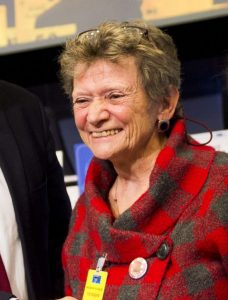President of ILEU/DANET

EN: Carmen Stadelhofer had been the Academic Director of the Centre for General Scientific Continuing Education (ZAWiW) of Ulm University for more than 18 years (1994 – 2012) and during this time had implemented many projects (e.g. DANET, DASUN, DALEG, DASTO, Town Stories, EWA, Unlearned Lessons), some of them were awarded by the European commission for being good practice projects. She initiated in 1995 the non-formal European Network Learning in Later Life (LiLL), (www.lill-online.eu, coordination until 2008), in 2008 the European network Danube Networkers (www.danube-networkers.eu). Mrs. Stadelhofer organized several international LiLL-conferences and published a large number of articles and books.
Since her retirement Carmen Stadelhofer works as a volunteer. She is President of ILEU e.V. and President of the International Association Danube-Networkers for Europe (DANET) e.V., which she initiated with partner organizations in 2014. She is co-founder and member of the board of the Danube Civil Society Forum (DCSF).
Mrs. Stadelhofer’s personal professional specialization is the development of new activating methods in adult education utilizing action research, with focus on promoting lifelong learning for older adults, social participation and intergenerational dialogue with the aid of the new media. 2013-15 she was responsible for the international project “The Wanted Danube” (www.thewanteddanube.eu) in which more than 6.000 people from 8 Danube countries participated. This project was awarded with the European Citizen’s Prize 2015 of the European Parliament and the “Europalilie” of the German European Union. In 2016 she initiated and was responsible for the international project “Tastes of Danube.Bread.Wine.Herbs” (www.tastes-of-danube.eu) in which more than 100 organizations working in the areas of education, culture, social affairs and environment from 11 countries of the Danube Region participated. This project, financed mainly by the State Ministry of Baden-Württemberg has been continuing in 2017/2018 with the thematic focus “Bread connects”. The Danube projects include people of all ages, ethnic origins and life backgrounds and are supported by many (senior) volunteers in all Danube countries. In December 2018 this project was rated best of the 5 nominated civil society projects out of 150 applications from 27 EU-countries by the European Economic and Social Committee in Brussels.
As a convinced European, Carmen Stadelhofer has been developing since many years methods to overcome barriers through cooperation in projects and encounters – language and cultural and social barriers between people of different political and cultural origins in Europe, especially in the Danube Region. She has always been promoting the transfer of good practice methods for fostering European awareness and European identity to other educational providers. She is experienced in activating methods and in European projects with target groups of various educational backgrounds. She and her collaborators applied with big success project funds, have been actively involved in the projects named above and got prizes on national and international level
DE: Carmen Stadelhofer war über 18 Jahre (1994 – 2012) wissenschaftliche Leiterin des Zentrums für Allgemeine Wissenschaftliche Weiterbildung (ZAWiW) der Universität Ulm und hat in dieser Zeit viele Projekte realisiert (zB. DANET, DASUN, DALEG, DASTO, Stadtgeschichten, EWA, Unlearned Lessons), von denen einige von der Europäischen Kommission als Good-Practice-Projekte ausgezeichnet wurden. Sie initiierte 1995 das non-formale europäische Netzwerk Learning in Later Life (LiLL), (www.lill-online.eu, Koordination bis 2008), 2008 das europäische Netzwerk Danube-Networkers (www.danube-networkers.eu). Frau Stadelhofer organisierte mehrere internationale LiLL-Konferenzen und veröffentlichte eine Vielzahl von Artikeln und Büchern.
Seit ihrer Pensionierung arbeitet sie ehrenamtlich. Sie ist Präsidentin von ILEU e.V. und des Internationalen Verbandes Danube-Networkers for Europe (DANET) e.V., den sie 2014 mit Partnerorganisationen initiiert hat. Sie ist Mitbegründerin und Vorstandsmitglied des Danube Civil Society Forums (DCSF).
Frau Stadelhofer ist spezialisiert auf die Entwicklung neuer aktivierender Methoden in der Erwachsenenbildung mittels Aktionsforschung, mit dem Fokus auf lebenslanges Lernen für ältere Erwachsene, soziale Partizipation und des intergenerationellen Dialogs mit Hilfe der neuen Medien. 2013-2015 war sie verantwortlich für das internationale Projekt „Die gewollte Donau“ (www.thewanteddanube.eu), an dem mehr als 6.000 Menschen aus 8 Donauländern teilgenommen haben. Dieses Projekt wurde 2015 mit dem Europäischen Bürgerpreis des Europäischen Parlaments und der „Europalie“ der Deutschen Europäischen Union ausgezeichnet. Im Jahr 2016 initiierte und verantwortete sie das internationale Projekt „Tastes of Danube. Bread.Wine.Herbs.“ (www.tastes-of-danube.eu), in dem mehr als 100 Organisationen aus den Bereichen Bildung, Kultur, Soziales und Umwelt aus 11 Ländern des Donauraums teilgenommen haben. Dieses vor allem vom Land Baden-Württemberg finanzierte Projekt setzt sich 2017/2018 mit dem thematischen Schwerpunkt „Brot verbindet“ fort. Die Donauprojekte beziehen Menschen aller Altersgruppen, ethnischer Herkunft und Lebensumstände ein und werden von vielen (älteren) Freiwilligen in allen Donauländern unterstützt.
Als überzeugte Europäerin entwickelt Carmen Stadelhofer seit vielen Jahren Methoden zur Überwindung von Barrieren durch die Zusammenarbeit in Projekten und Begegnungen – sprachliche und kulturelle sowie soziale Barrieren zwischen Menschen unterschiedlicher politischer und kultureller Herkunft in Europa, insbesondere im Donauraum. Sie hat immer den Transfer von bewährten Verfahren zur Förderung des europäischen Bewusstseins und der europäischen Identität für andere Bildungsanbieter gefördert. Die Partner des angewandten Projekts waren an den oben genannten Projekten beteiligt. Sie sind erfahren in der Aktivierung von Methoden und in europäischen Projekten mit Zielgruppen mit unterschiedlichem Bildungshintergrund.

